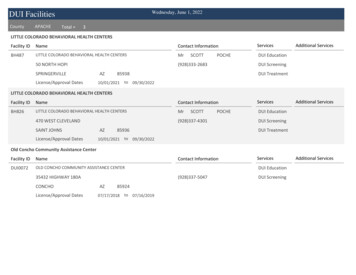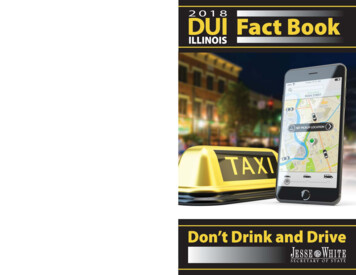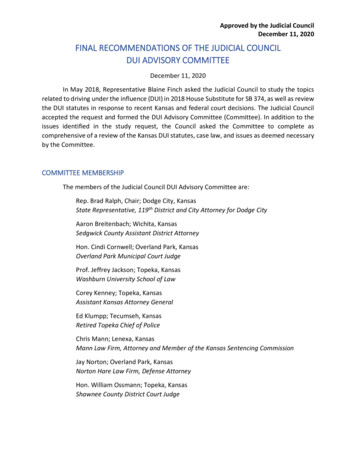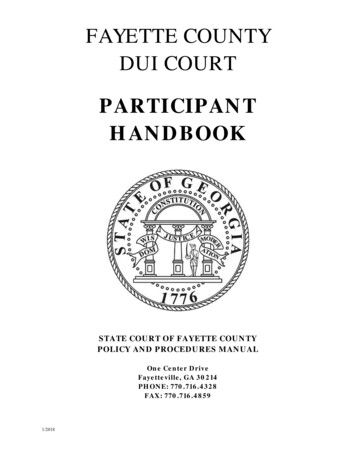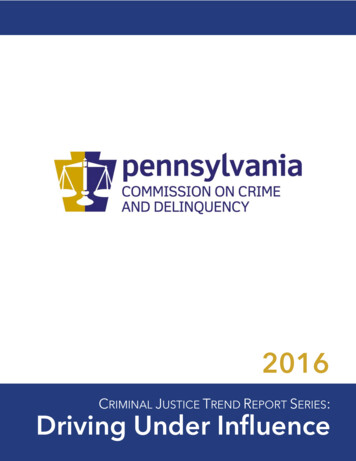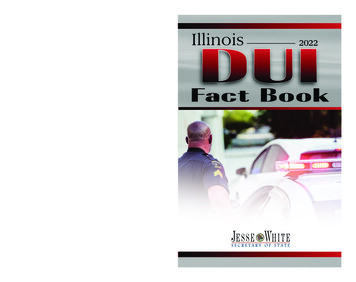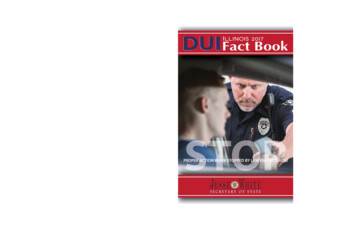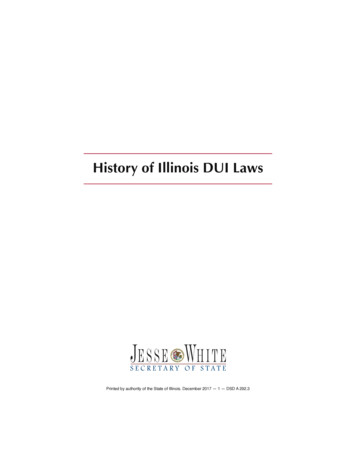
Transcription
DSD A 292.3 DUI History.qxp Layout 1 12/19/17 9:03 AM Page 1History of Illinois DUI LawsPrinted by authority of the State of Illinois. December 2017 — 1 — DSD A 292.3
DSD A 292.3 DUI History.qxp Layout 1 12/19/17 9:03 AM Page 2Effective Jan. 1, 1958 Established .15 as the illegal BAC limit.Effective Jan. 1, 1967 Lowered the illegal BAC limit from .15 to .10.Effective Jan. 1, 1980 Established 21 as the minimum drinking age.Effective Jan. 1, 1984 Established mandatory imprisonment of 48 hours or 10 days of community service for a second or subsequent DUI conviction. Expanded the Crime Victims Compensation Act to include DUI victims. Required courts to notify the Secretary of State’s office of DUI case dispositions,court supervisions and other serious offenses.Effective Jan. 1, 1986 Established the Statutory Summary Suspension Program to allow for the automatic suspension of a person’s driving privileges for refusing to submit to orfailing chemical testing following a DUI arrest. Expanded the Crime Victims’ Bill of Rights to include DUI victims. Provided that any person who refuses to submit to chemical testing while operating a vehicle in another state will have his/her driving privileges suspended.Effective Sept. 12, 1986 Provided that any driver under age 21 convicted of a second DUI will havehis/her driving privileges revoked until he/she turns 21 or for one additionalyear, whichever is longer.Effective Jan. 1, 1988 Provided that any driver under age 21 convicted of a second DUI will havehis/her driving privileges revoked for a minimum of 3 years. If convicted of athird or subsequent DUI, a driver will have his/her driving privileges revokedfor a minimum of 6 years.Effective Sept. 21, 1989 Provided that any driver who refuses to submit to chemical testing for a secondor subsequent time will have his/her driving privileges suspended for a minimumof 2 years. Offenders may not apply for a Restricted Driving Permit for the first6 months of the suspension period. 2
DSD A 292.3 DUI History.qxp Layout 1 12/19/17 9:03 AM Page 3Effective Jan. 1, 1991 Provided that any driver found at fault in a vehicle crash where serious personalinjury or death occurs and who refuses to submit to or fails chemical testing (.10BAC or more) will have his/her driving privileges suspended.Effective July 1, 1991 Provided that any driver who violates the Cannabis Control Act or the IllinoisControlled Substances Act while operating a motor vehicle will have his/her driver’s license canceled.Effective Nov. 3, 1992 Established the Crime Victims’ Rights Constitutional Amendment, which guarantees and protects the rights of crime victims, including those victimized byDUI.Effective Jan. 1, 1993 Prohibited any driver convicted of DUI within the last 10 years (rather than 5years) from receiving court supervision. Established the Child Endangerment Law, which states that any driver convictedof DUI while transporting a person ages 16 or younger is subject to a minimumfine and mandatory community service in a program benefiting children.Effective Jan. 1, 1994 Provided that any driver under age 21 convicted of illegal transportation of alcohol will have his/her driving privileges suspended for 1 year. For a second orsubsequent conviction, a driver will have his/her driving privileges revoked.Effective Jan. 1, 1995 Established the Zero Tolerance Law, which states that any driver under age 21caught with any trace of alcohol in his/her system will lose his/her driving privileges.Effective July 21, 1995 Prohibited a driver from receiving an RDP if he/she received a statutory summary suspension for a subsequent alcohol offense within 5 years for refusing tosubmit to chemical testing.Effective Jan. 1, 1997 Established a lifetime limit of one court supervision for a DUI offense. Provided that results of a driver’s blood or urine tests, performed for the purposeof determining the content of alcohol, other drugs or both, conducted duringmedical treatment in a hospital emergency room, may be reported to the IllinoisState Police or local law enforcement agencies. 3
DSD A 292.3 DUI History.qxp Layout 1 12/19/17 9:03 AM Page 4Effective July 2, 1997 Lowered the illegal BAC limit from .10 to .08.Effective Dec. 1, 1997 Increased the driver’s license revocation period to 5 years for a driver convictedof a second DUI. Increased the revocation period to 10 years for a third or subsequent conviction within 20 years. Increased the driver’s license revocation period to 2 years for a driver convictedof reckless homicide (DUI).Effective Jan. 1, 1998 Established a zero tolerance law for school bus drivers. A school bus drivercaught driving a school bus with any trace of alcohol in his/her system will losehis/her school bus driver permit. Increased the maximum fines for criminal penalties and the penalty for a pettyoffense to 1,000, a misdemeanor up to 2,500 and a felony up to 25,000.Effective Jan. 1, 1999 Prohibited a driver with a fourth DUI conviction on his/her record from applyingfor a driver’s license. Increased criminal penalties for a person driving on a suspended or revoked driver’s license and who is convicted of DUI during the suspension or revocationperiod. The offender’s vehicle is subject to seizure by local law enforcement. Increased the statutory summary suspension period to 3 years (from 2 years) fora repeat DUI offender who refuses to submit to or fails to complete chemicaltesting. Established a 250 statutory summary suspension and revocation fee for a drivercharged with a second or subsequent DUI offense. Increased the period of time in which the vehicle of a suspected DUI offendermay be impounded to a graduated scale depending on the number of times theoffender has been previously arrested for DUI. Prohibited a driver charged with driving on a suspended or revoked driver’s license for a previous DUI from receiving court supervision if he/she has beenconvicted of or received court supervision for driving on a suspended or revokeddriver’s license within the last 10 years. Included the term “intoxicating compounds,” such as sniffing paint and glue, inIllinois DUI law. Required hospital emergency rooms to report chemical test results of a persontreated in a vehicle crash to Illinois State Police or law enforcement officialsupon request.Effective Jan. 1, 2000 Mandated the Breath Alcohol Ignition Interlock Device (BAIID) for certain drivers convicted of DUI. 4
DSD A 292.3 DUI History.qxp Layout 1 12/19/17 9:03 AM Page 5 Prohibited a driver with an out-of-state DUI or a reckless driving convictionfrom receiving court supervision for the same offense in Illinois.Effective Oct. 1, 2000 Required all court supervisions, regardless of offense, to be reported to the Secretary of State’s office.Effective July 27, 2001 Prohibited a sentence of probation for a driver convicted of a fourth or subsequent DUI while his/her driver’s license is suspended or revoked for a prior DUIconviction, or for a conviction for a crash involving death or personal injury.Effective Aug. 3, 2001 Prohibited the Secretary of State’s office from issuing an RDP for 1 year to adriver with a second or subsequent revocation of his/her driving privileges forDUI. Increased penalties for a second DUI violation committed within 5 years, including 48 consecutive hours to 5 days imprisonment and 100 hours to 30 daysof community service.Effective Aug. 10, 2001 Established mandatory minimum jail time and community service for anyoneconvicted of driving with a suspended or revoked driver’s license as a result ofa conviction for DUI, reckless homicide, leaving the scene of an accident or astatutory summary suspension. Authorized judicial authorities to seize or immobilize the vehicle of a driverconvicted for a fourth DUI violation.Effective Aug. 17, 2001 Extended the prison sentence for a felony DUI conviction. Created and defined the category of Driving Under the Extreme Influence as adriver with a BAC of .16 or more. A driver convicted of this offense is subjectto enhanced penalties with mandatory minimum sentencing requirements. Enhanced penalties for a driver convicted of DUI with a child under age 16 in thevehicle, including mandatory minimum imprisonment and community service. Required a driver with two or more alcohol incidents on his/her driving recordto have a BAIID installed on his/her vehicle. A monthly fee, paid by the driver,is established for the maintenance of the BAIID.Effective Jan. 1, 2002 Required a person convicted of DUI to pay an additional 100 fine, which isdeposited into the Trauma Center Fund for distribution to Illinois hospitals andtrauma centers. Prohibited a person sentenced to prison for a conviction of reckless homicidefrom having his/her driving privileges reinstated until 2 years after the date of 5
DSD A 292.3 DUI History.qxp Layout 1 12/19/17 9:03 AM Page 6his/her release from prison. This period does not commence until the expirationof any period of mandatory supervised release or parole.Effective July 16, 2002 Provided for the seizure or forfeiture of the vehicle of a person convicted ofdriving while his/her driving privileges are suspended or revoked as a result ofa DUI, leaving the scene of a personal injury accident, reckless homicide, or fora statutory summary suspension related to the use of alcohol, drugs or intoxicating compounds.Effective Jan. 1, 2003 Required local liquor commissioners to report to the Secretary of State’s officeany conviction of a person under age 21 who purchases, accepts, possesses orconsumes alcohol. An underage person who violates this provision will receivea 1-year suspension or revocation of his/her driving privileges. Established mandatory minimum fines of 500 for a first offense and 2,000 fora second offense for a person convicted of providing alcohol to a person underage 21. If the underage person is involved in an incident where a death occurs,the person who provided the alcohol may be convicted of a Class 4 felony, whichcarries possible imprisonment of 1-3 years and a fine of up to 25,000.Effective July 18, 2003 Established Aggravated DUI involving a death as a Class 2 felony, with possibleimprisonment of 3-13 years if the violation results in the death of one person or6-21 years if the violation involves the deaths of two or more persons.Effective Jan. 1, 2004 Prohibited the operation of a watercraft or snowmobile while under the influenceof intoxicating compounds. Provided that a person convicted of or pleading guilty to DUI, including anyperson receiving court supervision for the offense, may be required by the courtto attend a victim impact panel. Authorized the court to order a defendant charged with DUI to refrain from operating a vehicle not equipped with a BAIID as a condition of bail.Effective June 1, 2004 Changed the Reckless Homicide provision to include any person convicted ofreckless driving in a construction or maintenance zone that results in the deathof an individual. The offense is a Class 2 felony with possible imprisonment of3-14 years; possible imprisonment of 6-28 years if a single incident involvingthe deaths of two or more persons.Effective July 6, 2004 Established Leaving the Scene of a Crash as a Class 4 felony, with possible imprisonment of 1-3 years. 6
DSD A 292.3 DUI History.qxp Layout 1 12/19/17 9:03 AM Page 7 Decreased the time allowed to report leaving the scene of a crash to local lawenforcement from one hour to 30 minutes.Effective July 12, 2004 Provided that a person convicted in another state of an offense similar to the Illinois reckless homicide statute may not be granted full driving privileges for 2years from the date of the person’s suspension or revocation, or within 2 yearsof the driver being released from a prison term for the offense. Established the offense of Aggravated DUI for a person committing DUI who waspreviously convicted in another state of an offense similar to the Illinois recklesshomicide statute and the driver’s intoxication was an element of the offense.Effective Oct. 1, 2004 Established a legal right of action for unlimited civil damages against any personover age 18 who provides or contributes alcohol or illegal drugs to anyone underage 18 and the provision of alcohol results in a death. Allows such suit for damages, injury or death if caused by the impaired minor.Effective Jan. 1, 2005 Provided that a driver convicted in another state of an offense similar to the Illinois reckless homicide statute may not be granted driving privileges for 2 yearsfrom the date of the person’s suspension or revocation, or within 2 years of thedriver being released from a prison term for the offense. Established that a person who commits DUI is guilty of Aggravated DUI ifhe/she has previously been convicted in another state of an offense similar tothe Illinois reckless homicide statute.Effective July 7, 2005 Authorized Illinois courts to impose more severe jail or prison sentences for adriver convicted of reckless homicide or DUI while operating a vehicle in excessof 20 mph over the posted speed limit.Effective Jan. 1, 2006 Provided that a driver seeking a Judicial Driving Permit (JDP), who is subsequently charged with driving on a suspended driver’s license or with anotherDUI before the JDP has been issued, is no longer eligible for a JDP. If a driverhas been issued a JDP and is charged with another DUI, the JDP will be canceled. Increased the penalties for DUI while transporting a child under age 16. Provided that a person charged with a felony DUI may not be prosecuted by amunicipal attorney, and the state’s attorney is prohibited from giving a municipalattorney this authority. Increased the penalties for a fifth or subsequent conviction of driving on a suspended or revoked driver’s license. 7
DSD A 292.3 DUI History.qxp Layout 1 12/19/17 9:03 AM Page 8 Increased the penalties for a driver convicted of Aggravated DUI causing thedeath of one or more persons. Increased the penalties for a third, fourth or fifth DUI conviction. Classified a sixth or subsequent DUI conviction as a Class X felony. Required a driver arrested for leaving the scene of an accident involving a deathor personal injury to be subject to chemical testing and a statutory summary suspension if he/she refuses to submit to or fails chemical testing. A driver is subjectto testing within 12 hours of the accident. Provided that a person charged with DUI, who has no valid driver’s license oris not covered by liability insurance, may be charged with Aggravated DUI andhis/her vehicle is subject to seizure and forfeiture. Provided that a driver involved in a fatal crash or a crash resulting in severe injuries that result in the injured party being carried from the scene is required toundergo chemical testing. Established tougher penalties for a person over age 21 convicted of DUI whiletransporting a child under age 16 that results in a crash and bodily harm to thechild. Provided that a driver convicted of Aggravated DUI because the DUI violationis the cause of death of one or more persons will be sentenced to imprisonment,unless the court determines that extraordinary circumstances exist and requireprobation.Effective May 8, 2006 Authorized municipalities to charge a DUI offender with a municipal misdemeanor offense for any conduct that constitutes felony DUI if the state’s attorneyrejects or denies felony charges for that conduct.Effective June 28, 2006 Authorized the circuit court to collect additional fines from drivers convicted ofDUI to be used for DUI enforcement and prevention.Effective Aug. 31, 2007 Prohibited a parent/legal guardian from knowingly authorizing or permittingany person under age 21 to consume alcohol in his/her home by failing to controlaccess to the alcohol in the residence. Prohibited a parent/legal guardian from knowingly allowing access to alcoholin his/her residence to persons under age 21, and from knowingly allowing persons under age 21 to consume alcohol in his/her residence.Effective Jan. 1, 2008 Required local liquor commissioners to report to the Secretary of State’s officecourt supervisions for violations relating to the transfer, possession and consumption of alcohol for persons under age 21. 8
DSD A 292.3 DUI History.qxp Layout 1 12/19/17 9:03 AM Page 9 Increased penalties for driving with a revoked driver’s license, permit or privilege to operate a motor vehicle if the revocation was the result of a recklesshomicide offense.Effective June 1, 2008 Required that a petition to contest the suspension of a person’s driving privilegesbe filed within 90 days of the effective date of the suspension if the suspensionwas the result of refusal to undergo alcohol/drug testing, or because drugs, intoxicating compounds or alcohol were found in the driver’s system. Eligibilityfor driving relief is dependent upon whether the denial of all driving privilegesmay cause undue hardship. Prohibited a driver convicted of four or more DUI offenses, leaving the sceneof an accident involving death or personal injury, and/or reckless homicide fromreceiving an RDP. Authorized the Secretary of State’s office to revoke the driving privileges of anyperson under age 21 convicted in another state of an offense similar to the IllinoisDUI statute. Established the offense of Reckless Homicide for a driver who kills a person in aposted school, construction or maintenance zone while driving more than 10 mphover the posted speed limit or under the influence of alcohol or other drugs.Effective Aug. 4, 2008 Established as a Class 4 felony if a person commits DUI outside the State ofIllinois while his/her Illinois driving privileges are revoked or suspended due toa previous DUI or a similar provision of the Illinois Vehicle Code.Effective Aug. 15, 2008 Allowed unused, opened wine purchased in a restaurant to be transported in accordance with Illinois law. Prohibited charter buses being used for school purposes from transporting, carrying or possessing alcohol in the vehicle.Effective Jan. 1, 2009 Required a first-time DUI offender to have a BAIID installed on his/her vehicleas a condition of driving relief. The driver must drive only a vehicle equippedwith a BAIID. Replaced the Judicial Driving Permit with the Monitoring Device Driving Permit(MDDP) for first-time DUI offenders. Required a driver with a BAIID installed in his/her vehicle because of a secondor subsequent DUI conviction to submit to the Secretary of State DUI Administration Fund an amount not exceeding 30 for each month he/she uses the device. Established a 30 administrative fee paid by the offender for issuance of anMDDP to be deposited into the Monitoring Device Driving Permit Administration Fee Fund. 9
DSD A 292.3 DUI History.qxp Layout 1 12/19/17 9:03 AM Page 10 Allowed a DUI offender who initially chose not to request an MDDP to petitionthe court for an MDDP later in the suspension period. An offender is not eligiblefor an MDDP if he/she was previously convicted of Aggravated DUI involvinga death. Allowed an MDDP to be canceled if an offender is convicted of or placed oncourt supervision for specified offenses, or if an offender attempts to removethe BAIID from his/her vehicle without Secretary of State authorization. Increased the suspension period for a first offense for failing chemical testingto 6 months, and 12 months for a first offense for refusing to submit to chemicaltesting. Allowed a driver with an RDP to transport children living in the person’s household to and from day care or an acceptable educational institution.Effective Aug. 11, 2009 Increased the penalties for a DUI conviction following a conviction of recklesshomicide or a similar provision in any other state to a Class 3 felony (rather thana Class 4) with possible imprisonment of 2-5 years and a 25,000 fine. Established mandatory court-ordered restitution for all defendants convicted ofDUI that caused personal injury, or real or personal property damage.Effective Jan. 1, 2010 Allowed for vehicle seizure and forfeiture for driving with a revoked or suspended driver’s license due to a reckless homicide conviction.Effective Jan. 1, 2011 An RDP may be issued to a driver convicted of DUI to transport children, elderlypersons or disabled persons who do not have driving privileges and are livingin the driver’s household. Allows for vehicle forfeiture for committing DUI and knowing that the vehiclebeing driven was not covered by liability insurance. Increases the amount of an administrative sanction imposed upon a person convicted of DUI from 500 to 750. Requires that a person accompanying or providing driving instruction to a minordriver holding an instruction permit must not be under the influence of alcohol,drugs, intoxicating compounds or any combination thereof.Effective Feb. 14, 2011 Provides for the automatic issuance of an MDDP by the Secretary of State (ratherthan issued by the court at the request of the offender) to an eligible first-timeDUI offender. The offender may file a petition to decline issuance of the MDDPwith the court. 10
DSD A 292.3 DUI History.qxp Layout 1 12/19/17 9:03 AM Page 11Effective July 1, 2011 Requires a statutory summary revocation of a driver’s license or privileges fora driver who refuses chemical testing after being involved in a vehicle accidentresulting in serious injury or death to another person.Effective Aug. 8, 2011 An employee who incurs injuries while involved in an Aggravated DUI or Reckless Homicide and is subsequently convicted is not eligible for workers’ compensation benefits.Effective Aug. 22, 2011 If a law enforcement officer has probable cause to believe a driver is operatinga vehicle under the influence, the officer may request that the driver submit to achemical test.Effective Jan. 1, 2012 Local municipalities may impound vehicles and impose administrative fees ona vehicle where the driver was arrested for driving under the influence. If unclaimed, the vehicle can be disposed of as determined by the municipality. Theregistered owner of the vehicle may request a hearing to contest the fees. Employers of school bus drivers may request an alcohol/drug test if there is reasonable suspicion that a driver may be under the influence. The employer mustreport to the Secretary of State within 48 hours if the school bus driver refuses tosubmit to testing, or if the driver’s test reveals a BAC of more than 0.00 or anytype of illegal drugs. A positive test or a refusal to submit to testing results in a3-year suspension of the school bus driver’s permit.Effective July 20, 2012 The Secretary of State shall immediately revoke the driving privileges of a person convicted of a second or subsequent conviction of illegal possession whileoperating or in control of a motor vehicle. A first-time conviction shall result insuspension of driving privileges for a period of 1 year.Effective Jan. 1, 2013 Parents or guardians who knowingly permit their residence, or any other privateproperty under their control (instead of just their residence), to be used by aninvitee under age 21 for the purposes of underage consumption of alcohol, isguilty of a Class A misdemeanor. A motor vehicle used by an individual who is driving on a suspended or revokedlicense is subject to seizure and forfeiture if the person’s driving privileges wererevoked or suspended as a result of: (1) DUI; (2) leaving the scene of a motorvehicle accident involving personal injury or death; (3) failure to submit to drugor alcohol testing; or (4) reckless homicide. 11
DSD A 292.3 DUI History.qxp Layout 1 12/19/17 9:03 AM Page 12 A driver under age 25 who is arrested or charged and receiving court supervisionfor a misdemeanor violation of the reckless driving statute, and who has no otherconviction for DUI or reckless driving, is not eligible for sealing or expungementof the violation from his/her record until age 25.Effective Jan. 1, 2014 A person diagnosed by a physician with a debilitating medical condition maybe issued a registry ID card by the Illinois Department of Public Health that allows the person to legally possess no more than 2.5 ounces of usable cannabis(marijuana) during a 14-day period. The law prohibiting motorists from havingany amount of cannabis in their system does not apply to a registry card holder.However, it is illegal for a card holder to drive while impaired by cannabis, andhe/she may be charged with DUI in those circumstances. Possession of medicalcannabis in a vehicle is prohibited unless the product is in a secured and sealedtamper-evident container that is inaccessible while the vehicle is in motion. A person can be charged with Aggravated DUI if he/she is driving a vehicle forhire carrying passengers. Persons subject to blood tests for refusal to submit to a breath test may be liablefor the cost (up to 500) of employing a medical professional to perform the testif the person is found guilty or pleads guilty to DUI. The penalties for driving on a suspended or revoked driver’s license are increased if the suspension or revocation was for reckless homicide, DUI, refusinga chemical test or leaving the scene of a crash involving personal injury or death. A person operating a watercraft under the influence and involved in a crash resulting in personal injury or death is subject to the same chemical testing as aperson operating a motor vehicle under the influence. If the person refuses chemical testing, he/she faces a driver’s license suspension.Effective Jan. 1, 2015 It is unlawful for a parent or guardian (instead of any person) to knowingly permit any vehicle, watercraft, or conveyance to be used in a manner that violatesthe underage drinking statute. Restores the statute allowing criminal penalties for any person to knowinglyauthorize or permit a residence that he/she occupies to be used by someone underthe age 21 if the person knows that the underage person possesses or is consuming alcohol.Effective Jan. 1, 2016 A first-time DUI offender is now eligible to apply for a Monitoring Device Driving Permit during the first 30 days of a statutory summary suspension. A repeat DUI offender is now eligible to apply for a Restricted Driving Permitduring a statutory summary suspension (previously no driving relief was available). 12
DSD A 292.3 DUI History.qxp Layout 1 12/19/17 9:03 AM Page 13 A person whose driver’s license has been revoked for life as the result of 4 DUIconvictions may apply for a Restricted Driving Permit after serving a 5-year revocation and proving a minimum of 3 years of abstinence. The person may onlydrive vehicles that have been equipped with a Breath Alcohol Ignition InterlockDevice. A person with 2 or 3 DUI convictions must obtain a restricted driving permit,install a Breath Alcohol Ignition Interlock Device on all vehicles owned by theperson and may only drive vehicles equipped with the device for a period of 5years before full driving privileges are restored. A person who has resided in Illinois for a minimum of 10 years and whose driver’s license was revoked in his/her former state of residence may seek an administrative hearing to ask for the issuance of an Illinois driver’s license. A person under age 21 may not be charged with possession or consumption ofalcohol by a minor if that person (1) requested medical assistance for an individual due to alcohol consumption; (2) remained at the scene after contactingauthorities; and (3) provided his/her full name, other relevant information andcooperated fully with law enforcement officers.Effective Jan. 1, 2012 Local municipalities may impound vehicles and impose administrative fees ona vehicle where the driver was arrested for driving under the influence. If unclaimed, the vehicle can be disposed of as determined by the municipality. Theregistered owner of the vehicle may request a hearing to contest the fees. Employers of school bus drivers may request an alcohol/drug test if there is reasonable suspicion that a driver may be under the influence. The employer mustreport to the Secretary of State within 48 hours if the school bus driver refuses tosubmit to testing, or if the driver’s test reveals a BAC of more than 0.00 or anytype of illegal drugs. A positive test or a refusal to submit to testing results in a3-year suspension of the school bus driver’s permit.Effective July 29, 2016 Any person with a THC level of 5 nanograms or more per milliliter of wholeblood or 10 nanograms or more per milliliter of other bodily substances may becharged with DUI.Effective Aug. 12, 2016 The Chief Judge of the circuit court of any Illinois county may order the establishment of a program for electronic monitoring of offenders for alcohol anddrug consumption.Effective Jan. 1, 2017 A guilty plea will not be accepted until all penalties have been explained including the possible loss of driving privileges. The Secretary of State shall notify the driver and the Illinois Department of Public Health will revoke a medical cannabis card for a driver convicted of a felony 13
DSD A 292.3 DUI History.qxp Layout 1 12/19/17 9:03 AM Page 14violation of the state or federal Control Substance Act, the Cannabis Control Actof the Methamphetamine Control Act.Effective Aug. 11, 2017 Public officials shall report to the Secretary of State when a juvenile has beenconvicted or received court supervision for a DUI while operating a snowmobileor watercraft.Effective Aug. 22, 2017 Enhanced penalties apply upon conviction for driving while revoked if the driveris revoked for aggravated DUI that resulted in death. The prosecution may becommenced at any time. 14
DUI. Effective Jan. 1, 1993 Prohibited any driver convicted of DUI within the last 10 years (rather than 5 years) from receiving court supervision. Established the Child Endangerment Law, which states that any driver convicted of DUI while transporting a person ages 16 or younger is subject to a minimum
